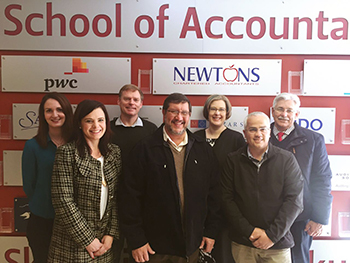
The lecturers of the 2016 BAccHons class: Liesel Botha,
Prof Alta Koekemoer, Prof Cobus Rossouw, Mr Kobus Swanepoel,
Dr Cornelie Crous, Prof Hentie van Wyk, and Mr Shaun Watson.
Photo: Supplied
The 2016 BAccHons students in the School of Accountancy at the University of the Free State achieved a 96% pass rate in the 2017 Initial Test of Competence (ITC) examinations of the South African Institute of Chartered Accountants (SAICA). The ITC examinations took place in January and June, and of the 49 students that partook in the examinations, 47 passed.
Prof Hentie van Wyk, Programme Director of the School of Accountancy, said with these results, the School of Accountancy ranks among the top accountancy institutions in South Africa. “The UFS is one of 14 accredited universities offering the SAICA-accredited programme,” he said.
New teaching model a success
A new teaching and learning module, which was introduced by the School of Accountancy in 2013, seemed to have fuelled the success of the students, as it is now more learner-centred and introduced more structured support to students.
The same strategies will be followed for the current 2017 intake. “We achieved an average pass rate of 84.8% over the past five years and if we can build on that, it will be an achievement of note,” says Prof Van Wyk. However, students should understand that much of these achievements are in their own hands. “After leaving the UFS, they must continue with the preparations for the ITC examinations in order to guarantee their success. The ball is actually in the students’ court,” he said.
Of the African students, 91% were successful in the national examinations, while 100% of the Thuthuka bursary students passed. The average pass rate for the past five years is as follows:
2016 96%
2015 72%
2014 80%
2013 84%
2012 92%.